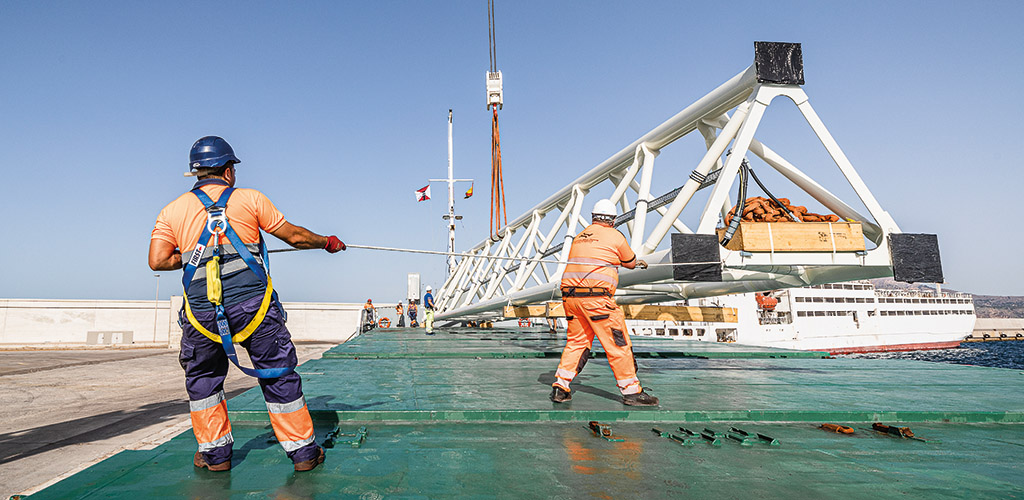Nov 05 | 2020
Erhardt’s Project Division Focuses on Digitalization

 By Felicity Landon
By Felicity LandonTowards the end of last year, Spain’s Erhardt Group launched its rebranded subsidiary, Erhardt Projects, to manage complex industrial projects. Igor Muñiz, who previously led Geodis’ industrial projects operations in Europe, joined Erhardt early in 2019 as general manager of the new venture, and started pulling together his new team.
Up to the point of Covid-19 hitting, he was clearly pleased with results so far. “For us to be competitive in the Spanish market has not been easy – but we knew that. I was not expecting such rapid growth. But we are really booming with orders,” he said.
Having been in the industry since 1998, he was persuaded to join Erhardt because the focus was to be tailored solutions to customers.
“At Erhardt we have stevedoring, ship agency, freight forwarding, technology and now a project cargo division. Erhardt is a very well-known and established company from 1882 and wanted to develop the business. For me, what really persuaded me to make this move was to be able to bring value to our customers in a different way. We want to be niche, we want to be very unique with a boutique approach, and we want to be experts in transport focusing on engineering, chartering and projects,” Muñiz said.
Erhardt Projects also wants to take a very selective approach with clients, he added. “The idea is to provide competence, knowledge and expertise. No matter how difficult or complex the parameters, we want to put our niche customers in the center.”
He emphasized the need for teams like his to be flexible and to be clear about their customers’ reality. “To understand the challenges of our customers’ constraints is vital. These days many big operators are like elephants – it’s difficult for them to make decisions quickly. But in this industry, you need to be very agile, because the requirements are bigger and volatile, and you have to adapt and improve in order to reach targets.”
In particular, he is driving forward with a digitalization strategy, confident that Erhardt Projects can differentiate itself due to its established technology and technical expertise. Putting in place a digital front-end provides customers with a convenient one-stop shop experience and improves internal operational visibility, he said.
“Our group has been focused on technology for 30 years,” he explained. “We have created a platform for Erhardt Projects in which we are sharing all of our projects digitally with suppliers and customers and we are seeking digital solutions in an open, innovative way.”
Four-prong Digital Plan
Muñiz is reluctant, of course, to give too much away. But he explained that Erhardt Projects is working on four digital approaches: procurement, operations, engineering and chartering.
It is working on a digital supply chain in parallel with its traditional, physical supply chain. He envisages a digital supply chain where all those involved – suppliers, stevedores, haulers, ports, customs and so on – understand each other and work together.
“Even though we are witnessing a huge transformation of the sector, with the logical uncertainties that anything new involves, it is no less certain that we are seeing huge opportunities and we are therefore decisively and eagerly pressing to opt to be one of the trusted partners that the new Industry 4.0 concept demands,” Muñiz told a Spanish business publication recently.
“Moving special loads requires a high level of specialization, transparency and greater protection of the transported goods. Erhardt Projects is therefore being integrated in the value chains of customers and suppliers by offering a service encompassing engineering, technology, process and regulatory consultancy, assurance and, of course, transport.”
Erhardt Projects has also set up its own engineering department, which designs and develops equipment specifically to transport oversize and overweight loads.
Overall, said Muñiz, the target is to be a global player. Based in Bilbao, Erhardt has its own offices in China, Portugal and France. “However, Erhardt Projects mainly works through business partners and a global network of agents. Each project is different – it requires different experts and partners.”
Having a global network of in-house teams can be an advantage, but can also be a disadvantage, he pointed out. “You can’t possibly have experts on every type of project in every place. And if you have a permanent team of 10 people working on a specific project, what do you do when that project finishes? Therefore, we work with partners which have the equipment we need and that talk our language.
“Often customers say to us that they want to collaborate with a particular partner – they do know the market and they do have their preferences, and we respect that. I firmly believe that having local agents, business partners and a range of expertise is the right way to make things work.”
Within 10 months of starting work at Erhardt, Muñiz’s new operation had 14 technical and operations staff on the team. “These days, we are in the top four in the Spanish market. We are active in North Africa, France, the Middle East and the U.S. We have strong partners we are doing business with and I am really excited.”
Keeping Pace with Change
Even before Covid-19, it was clear that the industry was changing very fast, with key global players withdrawing or contracting, underlining the importance of adaptation. Those that do not adjust through digitalization and innovation will disappear, Muñiz said. “Customers want you to adapt to their needs.” Because of its smaller size, Erhardt prides itself on its focus, niche approach and ability to make fast decisions.
Erhardt believes that providers should design offerings that can be tailored to customers’ needs. Building long-term relationships and becoming leaders in innovation are essential for maintaining a competitive advantage, Muñiz said.
“And big companies want plans A, B and C. You have to have a contingency plan and you have to know how to mitigate and manage risk. There can be too many layers in decision-making – it needs to be simple. A contract with 43 different deviations of what might happen is extremely difficult to sign and manage. But the project industry is changing extremely fast – not just in the past three to four years but in the past year and last months. This is a new era that we have to go into.”
Companies are also demanding more engineering and more services across chartering and the legal aspects, he said. Standards are higher and time to market is critical.
With project cargo getting larger and more complicated by the day, engineering knowhow is paramount, Muñiz said. Those that are not able to provide that are “automatically out,” he said.
“You need to be best in class for everything, A to Z.”
Felicity Landon is an award-winning freelance journalist specializing in the ports, shipping, transport and logistics sectors.
Image credit: Erhardt Group
